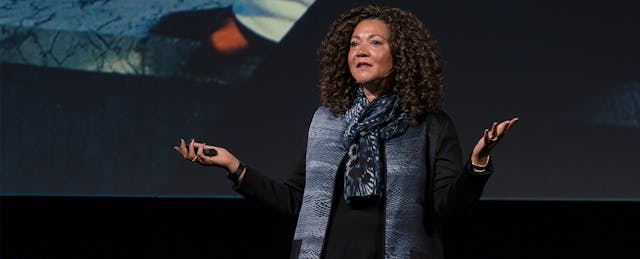Denver—For many students, school may be the most diverse setting they experience in their entire lives. And former NPR host Michele Norris is working to use that opportunity to get classrooms talking about race, and to share their “experiences, questions, hopes, dreams, laments or observations.”
“You lose the opportunity if you don’t find a way to talk to each other,” she said in an interview this week. And she argues that these classroom conversations can have long-term impacts, even if no one’s mind is changed in the moment. “I’m not talking about finding common ground,” she added. “You might leave the conversation more offended than you came in.”
Her method is simple: She gives out postcards and asks people to distill a statement about their experience of race into just six words.
The results can be powerful, and revealing.
“Reason I ended a sweet relationship.”
“Grandma you can’t say that anymore.”
“Lady, I don’t want your purse.”
Norris calls it The Race Card Project, and she’s been running it since 2010. It’s not just for educators—it started as a series on NPR when she was a host of its evening news show, All Things Considered, and asked listeners to send in their own cards. The goal, she said, is to create a national dialogue. But Norris says that hundreds of schools have used the exercise, and that it has been embraced at colleges as well.
She presented highlights from the project during the opening keynote of this week’s EDUCAUSE annual meeting here, and called on those in the audience to start their own dialogues about race. The conference, focused on chief technology leaders in higher education, drew more than 8,000 attendees.
The project has received more than 150,000 cards from around the country, and the world, Norris said. Most of the messages from the cards have been posted to the project’s website, and Norris says the digital forum has given the effort the most power and reach.
“We have a lot of cards about education,” she told the audience. “Teachers often send in their stories because they say no one is listening to them. Professors often send in their stories because they don’t have a place to discuss them.”
One teacher shared the story of when a student of color told her that her “dad was in car sales” and she misheard it as “my dad is incarcerated.” It caused the teacher to reflect on her own bias and assumptions, and to start a discussion at her school, Norris said.
Race and identity are certainly flashpoints on many campuses today.
Just this week, the University of St. Thomas, in Minnesota, cancelled all classes to hold a campus-wide discussion about race, bigotry and hate speech, after a racist message was found scrawled on a student’s door.
In her keynote this week, Norris compared her project to turning on a light in a dark room. Before the light goes on, people are stumbling around stubbing their toes on the furniture. The hope is the light will show where people are most often tripping up.
In an interview with EdSurge backstage just after her talk, Norris called herself an optimist, despite the many disturbing and frustrating sentiments her postcard project has unearthed.
“I’m from Minnesota, optimism is in the water up there,” she joked. “We're trying to make sure that we show a window in a mirror what's actually happening.”
“We are not about bringing people together to sing ‘kumbaya’ in the same octave,” she said. “But you will be enlightened because you will understand how someone came to a point of view that [maybe] you abhor. You will see their humanity, and perhaps they will see yours, and you will understand them a little bit better. So when you are trying to develop policy, when you are trying to navigate the world, you at least understand a little bit more about people who live in a different world than you.”
She ended her keynote paraphrasing a quote from Albert Einstein: “The mind, once it counters a new idea or a new perspective, rarely returns to its original size.”


